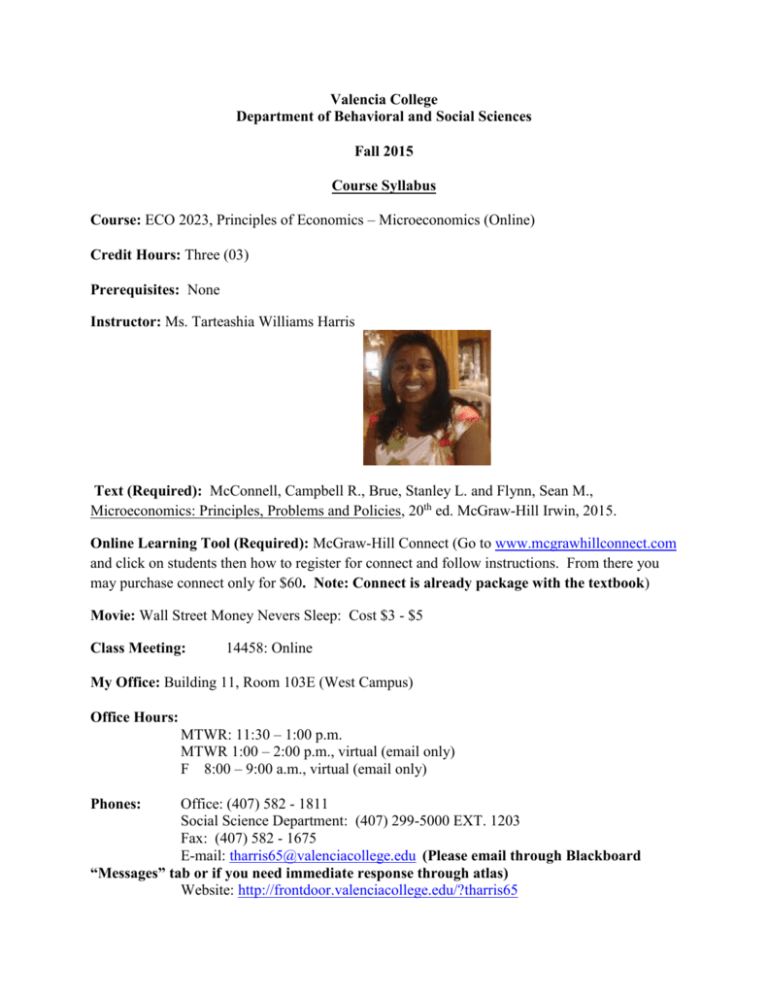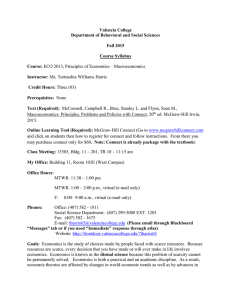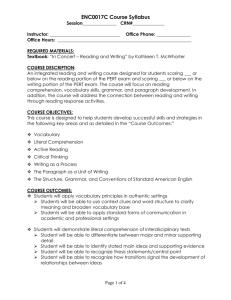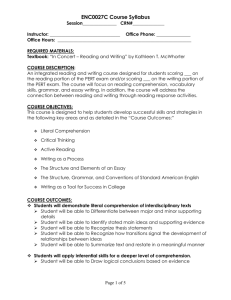Microeconomics Online Fall 2015
advertisement

Valencia College Department of Behavioral and Social Sciences Fall 2015 Course Syllabus Course: ECO 2023, Principles of Economics – Microeconomics (Online) Credit Hours: Three (03) Prerequisites: None Instructor: Ms. Tarteashia Williams Harris Text (Required): McConnell, Campbell R., Brue, Stanley L. and Flynn, Sean M., Microeconomics: Principles, Problems and Policies, 20th ed. McGraw-Hill Irwin, 2015. Online Learning Tool (Required): McGraw-Hill Connect (Go to www.mcgrawhillconnect.com and click on students then how to register for connect and follow instructions. From there you may purchase connect only for $60. Note: Connect is already package with the textbook) Movie: Wall Street Money Nevers Sleep: Cost $3 - $5 Class Meeting: 14458: Online My Office: Building 11, Room 103E (West Campus) Office Hours: MTWR: 11:30 – 1:00 p.m. MTWR 1:00 – 2:00 p.m., virtual (email only) F 8:00 – 9:00 a.m., virtual (email only) Phones: Office: (407) 582 - 1811 Social Science Department: (407) 299-5000 EXT. 1203 Fax: (407) 582 - 1675 E-mail: tharris65@valenciacollege.edu (Please email through Blackboard “Messages” tab or if you need immediate response through atlas) Website: http://frontdoor.valenciacollege.edu/?tharris65 Goals: Economics is the study of choices made by people faced with scarce resources. Because resources are scarce, every decision that you have made or will ever make in life involves economics. Economics is known as the dismal science because this problem of scarcity cannot be permanently solved. Economics is both a practical and an academic discipline. As a result, economic theories are affected by changes in world economic trends as well as by advances in economic research. In this course, students will acquire an understanding of several macroeconomic theories by examining how the economy functions. Learning to analyze problems and make decisions is a major theme throughout the course. What you learn in this course will help you to make informed decisions in your role as voters, consumers, workers and citizens. Course Description: Introduction to economic theory and fundamentals of economic analysis. Emphasis on study of microeconomics: market structure, price determination, factors of production, distribution of income and effects of monopoly and oligopoly on markets. For prospective economics majors and students with interests in specialized business curricula, completion of full Principles of Economics sequence is highly recommended. Valencia Student Core Competencies: The Valencia Student Core Competencies (Think, Value, Act, and Communicate) are an established component of the College’s curriculum development and review process. A detailed overview can be found in the current Valencia Catalog, pp. 18 or on the Valencia Website http://www.valenciacc.edu/competencies/default.asp. Examinations: You will take three exams during the course of this semester. All three exams must be taken to pass this class. If you do not take an exam – including the final - a zero will be given as a grade for that exam and averaged into your overall grade. Exams may be combination of essay, short answer, and/or multiple choices. There will be no make-ups for exams or final exam unless special arrangements are made in advance. Only written physician excuses will be considered for missing an exam or final. The final must be taken on the date it is given. All exams will be taken online. A study guide will be posted one week prior to each exam. Modules: Modules are your weekly assignments (Lectures, Homework and Learnsmarts) In a typical week, you will have one or two modules due You will have one week to complete the module, though some parts may be due earlier Follow your course schedule for due dates You must read over the entire module found in the course content for specifics on each module Modules will vary in nature and so will the methods for completing them Modules will vary in nature based on topics and needs of the class. Modules may include, but are not limited to: Connect (learn smarts and homework questions) prepared questions from me and questions from the text Modules turned in late (after it is closed on Blackboard) will not be accepted. Make up work is not accepted. Or Extra Credit: There will be an opportunity to obtain up to five (5) points of extra credit before each exam. Quizzes: There will be a quiz each week (total 5). Your quiz grade may be used to replace your lowest test score (1st or 2nd exam only!). Discussions: You will be required to initiate five threads, and respond to five threads posted by your classmates on topics in the Discussion link. See the course schedule for due dates. Current Event Journal: A current events journal will be due this semester. Throughout the semester students will collect an article relating to economics each week and write a full onepage summary of the article and how it relates to microeconomics. The summary should be typed, 12 inch font, double spaced with the original article attached (web links are not acceptable). The article must be current and must show the original date. The collection of the articles will begin on the week of September 7, 2015. The articles and summaries will be due (submit through Blackboard) the Thursday of each week (total 10). In your summaries, you will be expected to describe what you have read in simple language organized into coherent sentences and paragraphs. If you make serious spelling, grammar or syntax errors, five or ten points will initially taken off your grade. Grading: The weights for the exams and the other assignments are as follow: Exam 1 Exam 2 Final Exam Current Event Journal Modules Discussions = 10% = 15% = 25% = 10% = 30% = 10% Grading Scale: 90% and above 89% - 80% 79% - 70% 69% - 60% 59% and below =A =B =C =D =F Make-ups: No make-ups for exams or final exam unless special arrangements are made in advance. Only written physician excuses will be considered for missing an exam or final. Academic Dishonesty and Student Code of Classroom (Online) Conduct: Any student found guilty of academic dishonesty or cheating in academic work shall be subject to disciplinary action. Student Code of Conduct http://valenciacollege.edu/generalcounsel/policydetail.cfm?RecordID=180 Copyright Policy http://valenciacollege.edu/generalcounsel/policydetail.cfm?RecordID=48 Educational Work Products http://valenciacollege.edu/generalcounsel/policydetail.cfm?RecordID=58 Discrimination and Harassment http://valenciacollege.edu/generalcounsel/policydetail.cfm?RecordID=15 Information Technology Resources http://valenciacollege.edu/generalcounsel/policydetail.cfm?RecordID=56 Acceptable Use of Information Technology Resources http://valenciacollege.edu/generalcounsel/policydetail.cfm?RecordID=247 FERPA and Student Records http://valenciacollege.edu/generalcounsel/policydetail.cfm?RecordID=186 FERPA Overview http://www.nacada.ksu.edu/Resources/FERPA-Overview.htm Student Records Procedure http://valenciacollege.edu/generalcounsel/proceduredetail.cfm?RecordID=186 Withdrawal Deadline/Policy: November 13, 2015 Per Valencia Policy 4-07 (Academic Progress, Course Attendance and Grades, and Withdrawals), a student who withdraws from class before the withdrawal deadline of (November 13, 2015) will receive a grade of “W.” A student is not permitted to withdraw after the withdrawal deadline. Students who stay in the class after this deadline are responsible to complete all work required for the course; e.g., homework, projects, tests, etc. If you choose to stop coming to the class after the Withdrawal deadline, you will be held responsible for all work missed, including the final. Any work which is not completed by the appropriate deadline will receive a zero. Hence, the final grade for the course will be determined by taking into consideration the percentages obtained by work which was turned in and the zeros given to work which was not turned in on time. Students can still be withdrawn by the college for violations of the college’s code of conduct policies. Any student who withdraws or is withdrawn from a class during a third or subsequent attempt in the same course will be assigned a grade of “F.” For a complete policy and procedure overview on Valencia Policy 4-07 please go to: http://valenciacc.edu/generalcounsel/proceduredetail.cfm?RecordID=75. If you miss three modules in a row, this is considered three absences which may result in your withdrawal from the course. Incompletes: As per college policy, an incomplete may be assigned if you are progressing satisfactorily and, for valid, well documented, reasons (emergencies such as serious illness requiring hospitalization), cannot complete the work of a course within the term. You should be aware that I rarely give incompletes; they are reserved for only the most exceptional circumstances. Proper documentation must be provided upon request. http://valenciacc.edu/catalog/10-11/default.htm. Pg. 90. Students with Physical or Learning Disabilities: Students with disabilities who qualify for academic accommodations must provide a Notification to Instructor (NTI) form from the Office for Students with Disabilities (OSD) and discuss specific needs with the professor, preferably during the first two weeks of class. The Office for Students with Disabilities determines accommodations based on appropriate documentation of disabilities. Contact information: West Campus SSB, Rm. 102 Ph.: 407-582-1523 Fax: 407-5821326. http://valenciacc.edu/catalog/12-13/default.htm. Pg. 47. The Difference between a Face-to-Face and Online Course The first week can feel overwhelming. It may take a while to learn your “virtual campus.” Online fits more easily into your schedule. Since most of the work is done at home, it requires more self-discipline in setting aside time to complete your assignments and studying. All reminders of due dates are electronic. If you don’t access the course regularly, you may miss key assignments and due dates (late work is not accepted). In an online course the responsibility for learning is shared by the participants and facilitators equally. It works best when you enjoy using technology and interacting with others online. Acquainting yourself with Blackboard for Microeconomics: Most classes at Valencia implement Blackboard in unique ways. If this is your first time taking an online course, it is advisable that you visit Blackboard 9.1 (BB9.1) Student Orientation. The following is a mini glossary of how I will be using the tab menu on the left hand side of the page this semester. I will make every effort to update this list as needed. Announcements: To communicate with the entire class, I will post weekly announcements. These announcements may include such things as updates or changes to the schedule or reminders about the exam or clarification on points the entire class seems to be struggling with. It is your responsibility to check these announcements. To avoid clutter, I will limit the visibility of these announcements. On your Blackboard homepage (not the course, but when you log into blackboard), you should see notifications of such updates as announcements, messages, assessments, etc. If you do not, check your settings. Course content page: This is the course “homepage” and I will likely refer to it as such. You will find your weekly learning modules here. The modules will be housed in three separate folders containing the material specific to each of the three units. Folders and modules will be released as they become due. Assessments: Here you find exams, quizzes, learn smarts and some homework assignments (Connect). Do not assume just because an assignment is found in the assessments tab that the grade will be counted as an exam or quiz. (Sometimes a given assignment is just easier for me to grade under this category.) It is your responsibility to read the module to find out where an assignment can be found. Assignments: Your Current events and other document style assignments will be submitted through the assignments tab. Documents can be uploaded as a word document or pasted in the text box. I prefer the latter, but either is fine. Mail: I prefer all class email to go through this Blackboard function as opposed to the Atlas email. You do not have to type an address in the bar; simply search for my name (or the name of another student if you wish to email someone in the class), select it, compose your email, and send. There is no reason to leave the Blackboard shell. If Blackboard is down, you can email me at tawilliams@valenciacollege.edu. Weblinks: Here I will provide links to various news organizations and other sites of interest that you may want to browse from time to time. It will help things in the class make more sense.) My grades: Your grades ☺ Check your progress here regularly What I expect of the students: You are expected to log into Blackboard at least three times a week. You are expected to read the weekly announcements posted in the course. You are expected to read your Blackboard email. You are expected to read the modules in the course content in their entirety You are expected to keep track of release dates and deadlines through the course calendar. You are expected to show initiative regarding your learning. You are expected to complete an average of two modules per week (this can vary). You are expected to spend anywhere from five to ten hours a week on the course. This course is worth three credit hours; I assume you spend three times that per week on the course. To be fully prepared for the exam, more time will be needed to fully understand the all parts of the sections. What you can expect from me: I will usually check email messages throughout the workday (8:30am – 4:30pm, Monday through Friday) and respond to your emails sent during that time within twenty-four (24) hours. On weekends, I may or may not check my email. If I do, I will reply. You can call me during my office hours. If I am in and available, I will answer. You can leave a message, but email is better. I will post modules by Monday mornings. Modules will rarely be released early. This class is not self-paced. I will not accept late work. It is important to stay current with assignments. I will post tests for a five-day period. You will have a study guide of topics, not actual questions from exam. I will do my best to keep up with grading. It may take as long as two weeks after an assignment was submitted to receive a grade. I spend time to grade assignments carefully and appreciate your patience. If at any time you have a question on an ungraded assignment, I will answer your query via email. Please do not feel you have to wait for me to grade it if you are confused on a particular point. Grade inquiries: Once an assignment is graded, you will have five days after the grade is posted to request a review of your grade. In order for me to review your work, I ask that you provide me with an explanation of why you think you should have gotten a different grade based on the rubrics included. I spend a lot of time working on grading and I expect you to consider my comments thoughtfully. That said, I do make mistakes from time to time so do not be afraid to ask why you were assigned a particular grade. However, do not expect to get an A for trying. The quality of the end product matters. Before asking me why you received a certain grade, please take the following steps: 1. Review my comments. 2. Make sure you have answered all parts of the question completely and correctly. 3. Make sure your assignment met the required deadlines. 4. In a couple of sentences, explain to me exactly why you think your grade should be different. Use the rubrics found in this syllabus to evaluate your own work and make your case. (Grading rubrics are provided in Blackboard.) Note: This course syllabus is subject to change; however, students will be informed in advance through announcements before such changes. Important Dates: September 7, 2015, Labor Day Holiday – No Classes October 8, 2015, College Night (West, East and Winter Park Campus - No Classes November 25 - 29, 2015, Thanksgiving Holiday– No Classes December 14, 2015, Final Examinations December 22, 2015, Final Grades Viewable in Atlas Note: This course syllabus is subject to change; however, students will be informed in advance through announcements before such changes. ECO 2023 – Fall Online 2015 General Course Objectives: Understand how scarcity frames the basic economic decision making process and resource allocation. Recognize the role of that self-interest and rational behavior plays in the decisionmaking process Use the role of theory and economic models to analyze individual, business and government decisions. Understand the market system and how prices are established. Describe the concept of profit and the components that impact profit in a market economy. Comprehend the impact of various market structures on prices, output and profit. Understand the historical rationale for and impact of government involvement in the micro economy. (Cultural & Historical Understanding) Understand the basis for and implications of international trade. The following is a Preliminary schedule of material that will be covered. Topics: Weeks 1 - 4: August 31- September 27, 2015, Introduction of Economics – Chapters 1, 2, 4, 5, 18, 21 Scarcity/Choice & Opportunity Cost for individual/ economy as a whole Economic Models Economics of Poverty / Crime History of Economics Economic Systems Role of Government Exam 1 – 10% Week 5 - 7: September 28 – October 18, 2015, Demand and Supply Model for a Single Product & Elasticity –Chapters 3 and 6 Demand, Law of Demand, Demand curve Determinants of Demand Supply, Law of Supply, Supply curve Determinants of Supply Changes in D & S vs. Changes in Qd & Qs Equilibrium, Surplus, Shortage Changes in D & S and Equilibrium Price Ceilings/Floors Case studies Elasticity of D/S Cross/Income elasticity Exam 2 – 15% Week 8- –15: October 19 – December 13, 2015, The Economics of the Firm – Chapters 913, 16 Behavior of the firm Costs (SR & LR) Labor Economics Four Market Structures (Pure competition, Monopoly, Monopolistic Competition, Oligopoly Final Exam – 25% Microeconomics Online Fall 2015 Date What will be released All assignments are due by midnight on the indicated date and will be released at the start of day. Week 1: August 31 – September 6 Week 2-: September 7 - 13 Modules One Homework 1 Learnsmarts (LS )chapter 1 Discussion 1 Module One and Two LS chapter 2, 4 and 5 Week 3: September 14 - 20 Module Two and Three LS chapter 18 Discussion 2 Week 4: September 21 - 27 Module Four and Five LS chapter 21 Exam 1 Study Guide Week 5: September 28 – October 4 Module Six Exam 1 LS chapter 3 Homework 2 Discussion 3 Modules Six and Seven Changes in Equilibrium Problems LS Chapter 6 Weeks 6: October 5 - 11 Week 7: October 12 - 18 Module Seven LS Chapter 6 Exam 2 Study Guide Week 8: October 19 - 25 Module Eight Exam 2 LS Chapter 9 Homework 3 Wedding Costs Module Eight Week 9: October 26 – What will be due If no section is indicated, assume that this is the final deadline for the module and all remaining portions must be submitted in their entirety. Assignments are always due by midnight on indicated date. LS Chapter 1 Discussion 1 Quiz 1 Current Event 1 LS Chapter 2 Quiz 2 LS chapters 4, 5, and 18 Current Event 2 Discussion 2 Quiz 3 Current Event 3 Homework 1 LS chapter 21 Exam 1 Extra Credit Current Event 4 Exam 1 Current Event 5 Quiz 4 LS Chapters 3 Discussion 3 Current Event 6 Quiz 5 LS chapter 6 Homework 2 Current Event7 Exam 2 Exam 2 Extra Credit LS chapter 8 November 1 LS Chapter 9 Homework 3 Wedding Costs Week 10: November 2 - 8 Week 11: November 9 - 15 Module Nine Market Structures Table LS Chapters 10 and 11 Discussion 4 Module Ten LS chapters 10 and 11 Quiz 6 Current Event 9 Current Event 9 Quiz 7 Discussion 4 Current Event 10 Quiz 8 LS chapters 10 and 11 Week 12: November 16 - 22 Module Ten LS chapter 12 Week 13: November 23 - 29 Week 15: December 7 - 13 Module Eleven LS Chapter 13 Discussion 5 Module Eleven LS Chapter 13 Final Exam Study Guide Module Eleven Quiz 10 LS Chapter 13 Discussion 5 Final Exam Extra Credit Week 16: December 14 Final Exam Final Exam Week 14: November 30 – December 6 Quiz 9 LS Chapter 12 Homework 3


